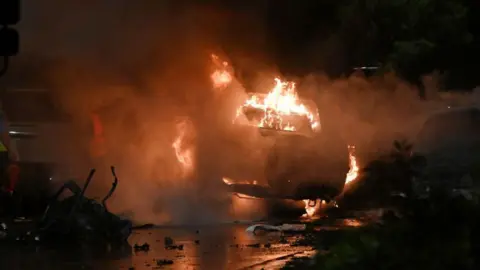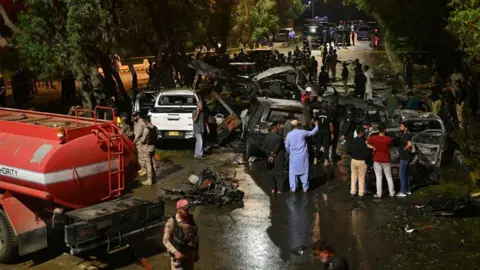Blast kills two Chinese near Pakistan’s Karachi airport
Two Chinese nationals have been killed and at least 10 people injured after a suspected suicide attack near Jinnah International Airport in Karachi, Pakistan on Sunday night.
A third body, not yet officially identified, is thought to be that of the attacker, the BBC understands.
The Chinese embassy in Pakistan said the explosion was a “terrorist attack” targeting a convoy of Chinese engineers working on a power project in the country’s Sindh province.
The separatist Balochistan Liberation Army (BLA), which has in recent years carried out attacks on Chinese nationals involved in development projects, has claimed responsibility for the attack.
 Getty Images
Getty ImagesIn a statement released on Monday, the militant group said it had “targeted a high-level convoy of Chinese engineers and investors” arriving from Karachi airport.
A later statement from the group described it as a suicide attack, and named the perpetrator as Shah Fahad, part of a BLA suicide squad called Majeed Brigade.
The attack was carried out using a “vehicle-borne improvised explosive device”, Reuters quoted the BLA as saying.
The explosion happened around 23:00 local time (17:00 GMT) on Sunday.
Pakistan’s Prime Minister Shehbaz Sharif called the attack a “heinous act” and offered his condolences to the Chinese people.
“Pakistan stands committed to safeguarding our Chinese friends,” he wrote on X.
The Chinese embassy said that the engineers were part of the Chinese-funded enterprise Port Qasim Power Generation Co Ltd, which aims to build two coal power plants at Port Qasim, near Karachi.
Thousands of Chinese workers are in Pakistan, many of them involved in creating an economic corridor between the two countries as part of Beijing’s multibillion dollar Belt and Road Initiative.
The Port Qasim plant is part of the corridor, along with a number of infrastructure and energy projects in Pakistan’s Balochistan province, which has a rich supply of natural resources, including gas and minerals.
The BLA along with other ethnic Baloch groups has fought a long-running insurgency for a separate homeland.
It has regularly targeted Chinese nationals in the region, claiming ethnic Baloch residents were not receiving their share of wealth extracted from foreign investors.
The Chinese embassy on Monday reminded its citizens and Chinese enterprises in Pakistan to be vigilant and to “do their best to take safety precautions”. The embassy added that it hoped Pakistan would thoroughly investigate the attack and “severely punish the murderer”.
 Getty Images
Getty ImagesThe blast was reportedly heard in various areas around the city, with footage from local media showing thick smoke and cars set alight.
Pictures online show security officials and firefighters investigating the explosion site, with several vehicles charred by the blast.
A police surgeon, Dr Summaiya told Dawn news: “Ten injured persons, including one in critical condition, have been brought the Jinnah Postgraduate Medical College [JPMC].”
She added the injured included a police constable and a woman.
A statement posted on X from Sindh’s Interior Minister’s office said that a “tanker truck” had exploded on Airport Road and said the minister was in contact with the Malir Senior Superintendent of Police (SSP) regarding the incident.
Roads leading to Jinnah International Airport were sealed off following the attack, but the airport is functioning as usual on Monday.
There has also been heightened security in Pakistan as it prepares to host the leaders’ summit of the Shanghai Cooperation Organisation (SCO).
There have been multiple attacks on Chinese nationals in Pakistan in recent years. The BLA has claimed responsibility for several of them, including an attack in March on a Pakistani naval airbase near the Gwadar port, another main feature of the China-Pakistan economic corridor.
In April 2022, the group killed three Chinese tutors and a Pakistani driver in a suicide bombing near Karachi University’s Confucius Institute.
In November 2018, gunmen killed at least four people in an attack on the Chinese consulate in Karachi.



